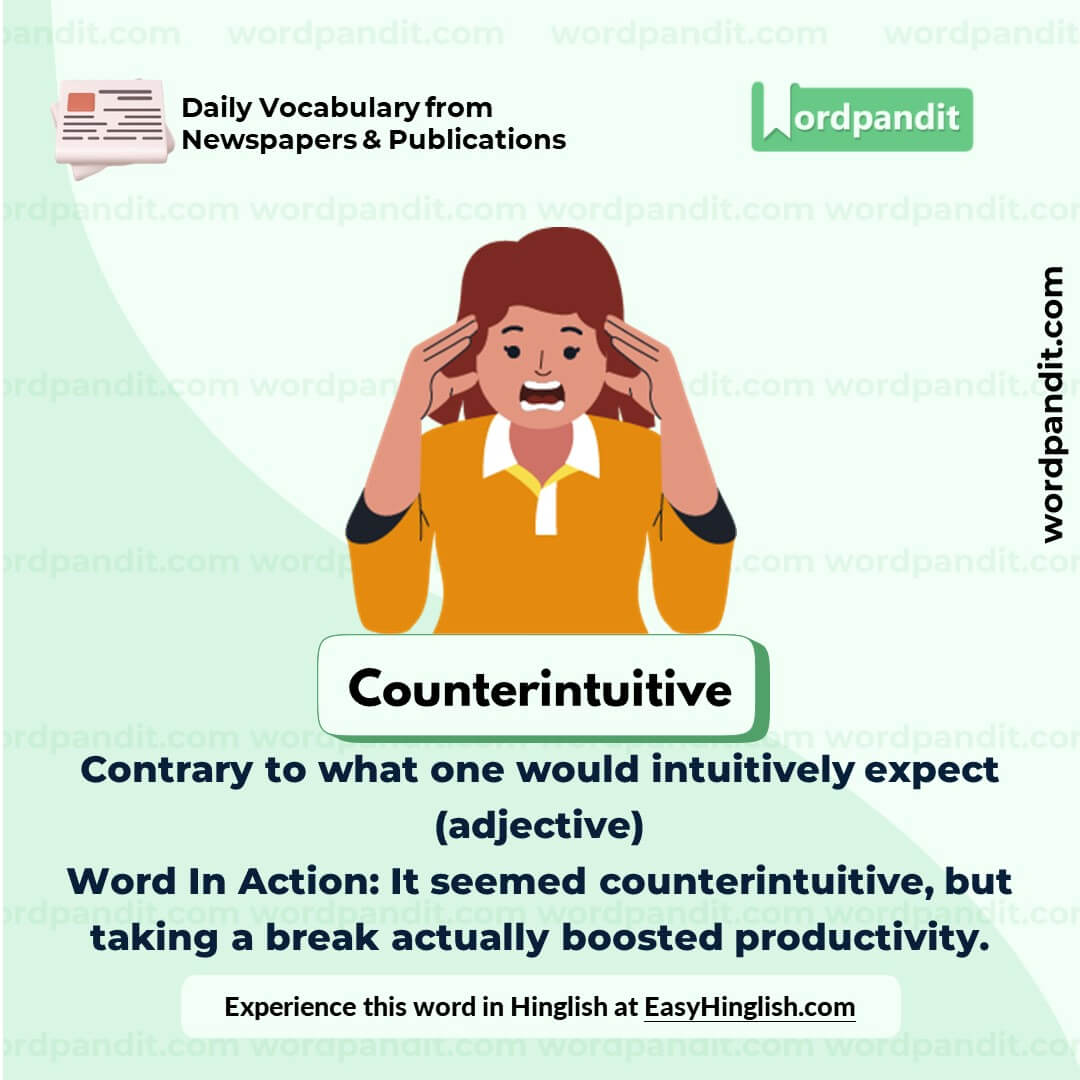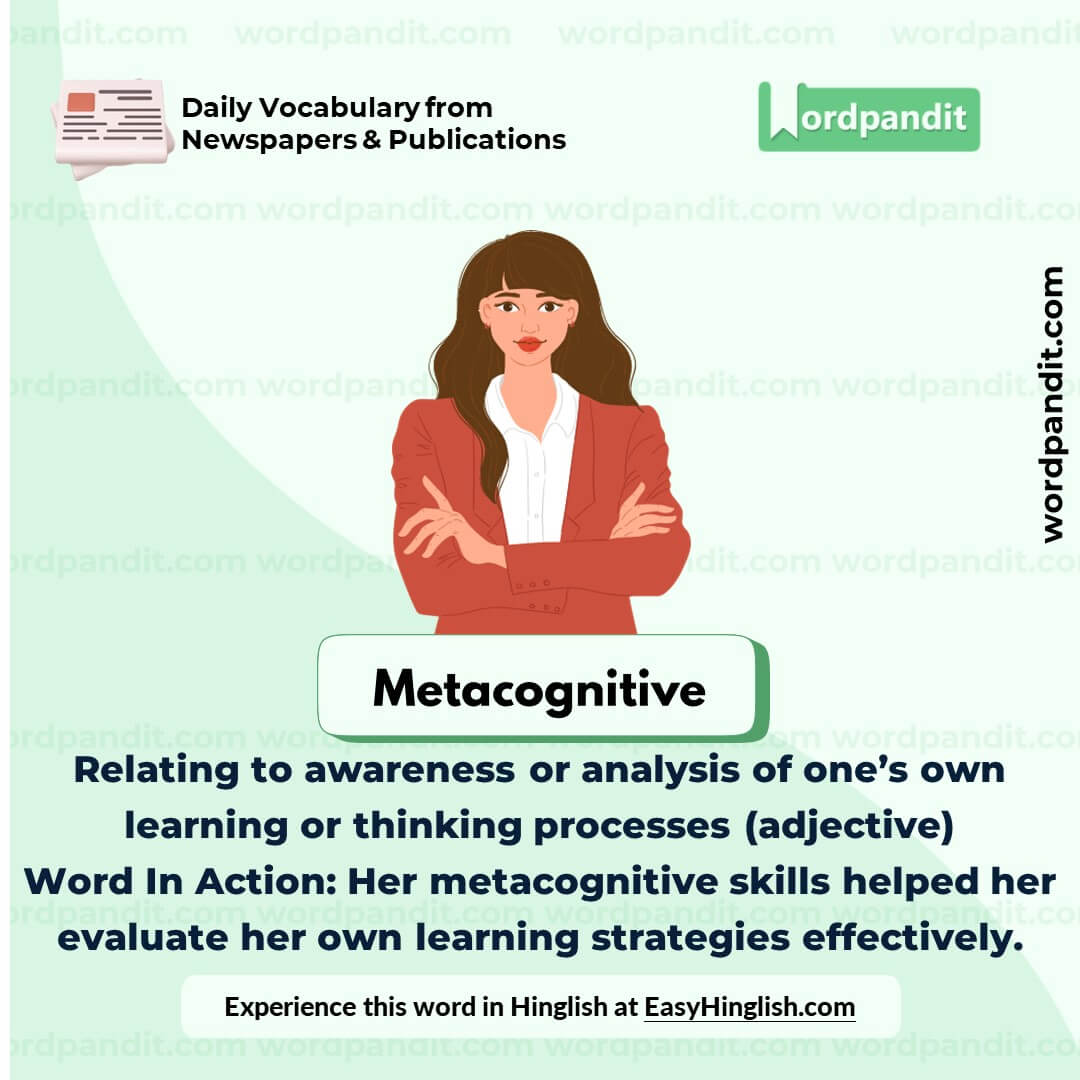Daily Vocabulary from International Newspapers and Publications
Expand Your Vocabulary with Wordpandit’s Global Vocabulary Hub
At Wordpandit, we are committed to helping you develop a truly global vocabulary by drawing from some of the most respected international publications. This section is designed to keep you ahead of the curve by introducing you to words that define global conversations and trends.
The Power of Global Sources
To help you think and communicate on a global scale, we curate vocabulary from renowned international sources, such as:
- The New York Times
- The Washington Post
- BBC
- The Guardian
- The Economist
- Scientific American
- Psychology Today
- And many more...
Stay Global, Stay Competitive
Our daily updates from international publications ensure you are consistently exposed to new words that reflect global news and developments, making sure your vocabulary is not only current but also globally relevant.
Enhance Your Global Perspective
Whether you’re preparing for international exams, aiming to excel in global business communication, or want to enhance your language skills for personal growth, Wordpandit offers the resources you need to thrive in a global context.
Effective Learning, Global Reach
Our learning methodology combines global examples, memory aids, and interactive activities, allowing you to internalize new words effectively and apply them in real-world scenarios.
Begin Your Global Vocabulary Journey Now!
Why Choose Wordpandit?
Practical Learning: Focus on words you'll actually encounter in real-world reading, enhancing your comprehension and communication skills.
Diverse Content: From current affairs to scientific breakthroughs, our varied sources expose you to vocabulary across multiple domains.
Effortless Integration: Make Wordpandit a part of your daily routine. Just a few minutes each day can significantly boost your lexicon over time.
Your Path to Vocabulary Mastery
- Visit our Daily Vocabulary section regularly
- Explore new words and their usage in context
- Practice incorporating these words into your own writing and speech
- Track your progress as your vocabulary expands
Start Your Journey Today
Embark on your vocabulary enhancement journey with Wordpandit. By consistently engaging with our daily posts, you'll build a robust vocabulary that serves you well in academic, professional, and personal contexts.
Remember, a word a day keeps linguistic limitations at bay. Make Wordpandit your daily companion in the quest for vocabulary excellence!
WORD-1: Pragmatic
Context:
"It’s a pragmatic way to group and treat presentations with similar symptoms, even though the relevant causes are not fully understood and are likely different in different people." - Psyche
Explanatory Paragraph:
The term pragmatic refers to a practical approach to dealing with issues. It focuses on what works in real-world situations rather than abstract ideas or theories. Pragmatism prioritizes efficiency and results, making it ideal for problem-solving and decision-making.
Meaning: Dealing with things sensibly and realistically in a way that is based on practical rather than theoretical considerations (adjective)
Pronunciation: prag-MAT-ik
Difficulty Level: ⭐⭐⭐ (Intermediate)
Etymology: From Greek pragmatikos, meaning "fit for action," derived from pragma, meaning "deed" or "act."
Synonyms & Antonyms:
Synonyms: practical, realistic, logical, sensible, utilitarian
Antonyms: impractical, unrealistic, idealistic, speculative, theoretical
Usage Examples:
- The manager's pragmatic approach helped the team meet their deadlines efficiently.
- Instead of debating endlessly, they took a pragmatic step to solve the problem immediately.
- Her pragmatic outlook on life allowed her to navigate challenges with ease.
- He suggested a pragmatic solution that saved time and resources.
Cultural Reference:
"Pragmatism emphasizes what works. It doesn't focus on the world as it 'should be,' but on how we can make progress in the world as it is." - A common principle in modern philosophy.
Think About It:
When faced with a complex issue, do you tend to take a pragmatic approach or an idealistic one? Why?
Quick Activity:
Think of a problem you've recently solved. Write down how a pragmatic approach helped (or could have helped) you resolve it.
Memory Tip:
Link "pragmatic" to "practical magic"—it's not about fantasy, but finding practical, effective solutions in real life.
Real-World Application:
Being pragmatic is crucial in careers like project management, where practical decisions lead to successful outcomes.
WORD-2: Counterintuitive
Context:
"Research from the 1960s was among the earliest to highlight the benefits of testing before learning – what is now called the ‘pretesting effect’ – and in recent years there has been a surge of interest in this counterintuitive effect." - Psyche
Explanatory Paragraph:
The word counterintuitive describes something that goes against what we might expect based on common sense or intuition. It refers to ideas, actions, or phenomena that seem odd or contradictory at first but often make sense upon closer examination.
Meaning: Contrary to what one would intuitively expect (adjective)
Pronunciation: koun-ter-in-TOO-ih-tiv
Difficulty Level: ⭐⭐⭐⭐ (Advanced)
Etymology: From Latin contra, meaning "against," and English intuitive, which derives from Latin intueri, meaning "to consider."
Synonyms & Antonyms:
Synonyms: unexpected, surprising, paradoxical, puzzling
Antonyms: intuitive, logical, expected, obvious
Usage Examples:
- The idea that exercising can boost energy levels is counterintuitive to many people who feel tired after a workout.
- It seems counterintuitive to invest in failing industries, but some investors see potential in their recovery.
- The counterintuitive strategy of slowing down to achieve better results often surprises athletes.
- Her counterintuitive decision to decline a promotion turned out to be the best choice for her career.
Cultural Reference:
The concept of "counterintuitive truths" is explored in Malcolm Gladwell's books, where surprising outcomes are explained through deep analysis.
Think About It:
Can you recall a time when you encountered a counterintuitive idea? How did you reconcile the initial confusion with its eventual logic?
Quick Activity:
List three examples of counterintuitive phenomena you’ve learned about. Briefly explain why they seem unexpected at first.
Memory Tip:
Remember "counterintuitive" by thinking of "counter" (against) and "intuitive" (natural understanding)—something that challenges your expectations.
Real-World Application:
Understanding counterintuitive concepts is essential in science and innovation, where breakthroughs often defy initial assumptions.
WORD-3: Metacognitive
Context:
"Pretesting acts as a metacognitive ‘reality check’, highlighting what you do and do not know." - Psyche
Explanatory Paragraph:
The word metacognitive relates to your awareness and understanding of your own thought processes. It involves thinking about how you think, learn, or solve problems. Metacognition allows you to assess and improve your learning strategies, making it a crucial skill for self-improvement.
Meaning: Relating to awareness or analysis of one’s own learning or thinking processes (adjective)
Pronunciation: met-uh-KOG-nih-tiv
Difficulty Level: ⭐⭐⭐⭐ (Advanced)
Etymology: From Greek meta, meaning "beyond," and Latin cognitio, meaning "knowledge."
Synonyms & Antonyms:
Synonyms: self-awareness, self-reflection, introspective
Antonyms: unreflective, unaware, oblivious
Usage Examples:
- She used metacognitive strategies to evaluate her learning process and improve her study habits.
- Teaching children to be metacognitive helps them take control of their education.
- Metacognitive reflection revealed that he was not using his time efficiently during exams.
- The researcher’s focus was on developing metacognitive tools to aid problem-solving skills in students.
Cultural Reference:
The concept of metacognition was popularized in the 1970s by psychologist John Flavell, who described it as a key to effective learning and problem-solving.
Think About It:
How often do you reflect on your own learning strategies? What steps can you take to become more metacognitive in daily life?
Quick Activity:
Write down one learning goal for this week. Plan how you will use metacognitive strategies to achieve it, such as monitoring your progress or evaluating your methods.
Memory Tip:
Break the word into "meta" (beyond) and "cognitive" (thinking)—it’s about thinking beyond regular thinking to improve your mental strategies.
Real-World Application:
Metacognition is essential in fields like education, where teachers use it to help students reflect on and optimize their learning processes.
WORD-4: Futile
Context:
"Any action can seem futile amid so much suffering. I’ve realised the important thing is to stop despairing and do something." - Psyche
Explanatory Paragraph:
The word futile describes actions or efforts that are ineffective or pointless. It conveys a sense of hopelessness or a lack of productive outcome, often associated with trying to achieve something that seems impossible or impractical.
Meaning: Incapable of producing any useful result; pointless (adjective)
Pronunciation: FYOO-tile or FYOO-tuhl
Difficulty Level: ⭐⭐⭐ (Intermediate)
Etymology: From Latin futilis, meaning "leaky, vain, or worthless."
Synonyms & Antonyms:
Synonyms: pointless, useless, ineffectual, hopeless, fruitless
Antonyms: effective, productive, successful, worthwhile
Usage Examples:
- After hours of trying to fix the engine, he realized his efforts were futile without the proper tools.
- Her futile attempts to convince them only led to frustration and disappointment.
- It seemed futile to protest against such an entrenched system, yet many chose to voice their opposition.
- The knight's futile quest for the mythical creature became the subject of countless tales.
Cultural Reference:
The famous phrase "Resistance is futile," popularized by the Borg in Star Trek, embodies the hopelessness of fighting against an unstoppable force.
Think About It:
Can you think of a time when something felt futile but you chose to persevere? What was the outcome?
Quick Activity:
Write about a seemingly futile situation you’ve faced and brainstorm one way it could have been approached differently.
Memory Tip:
Link "futile" to "feudal" times, where peasants often faced futile efforts to change their lives under oppressive systems.
Real-World Application:
Recognizing when efforts are futile helps prioritize tasks and focus on strategies that are more likely to succeed in personal and professional contexts.
WORD-5: Languish
Context:
"Farm animals languish in factory farms. Climate refugees are being displaced. Plastic waste is spreading through the ocean. Food insecurity now impacts more than 2 billion people." - Psyche
Explanatory Paragraph:
The word languish refers to a state of weakness, suffering, or neglect. It often describes individuals or groups enduring prolonged periods of hardship, stagnation, or lack of care, whether physically, emotionally, or socially.
Meaning: To suffer from being forced to remain in an unpleasant place or situation (verb)
Pronunciation: LANG-gwish
Difficulty Level: ⭐⭐⭐ (Intermediate)
Etymology: From Latin languere, meaning "to be faint or weak."
Synonyms & Antonyms:
Synonyms: weaken, deteriorate, wither, suffer, decay
Antonyms: thrive, flourish, prosper, revive, strengthen
Usage Examples:
- Without proper sunlight and water, the plants began to languish in the shaded corner of the garden.
- Many refugees languish in overcrowded camps, waiting for better living conditions.
- She felt her ambitions languish in a job that offered no room for growth.
- The old library languished for years until it was finally restored by a local nonprofit.
Cultural Reference:
The idea of languishing was widely discussed during the COVID-19 pandemic, as many people felt trapped and unmotivated due to prolonged isolation and uncertainty.
Think About It:
What are some situations in which people or communities tend to languish, and what steps can be taken to help them thrive instead?
Quick Activity:
Write down an area of your life where you feel you might be languishing. Brainstorm one small step you could take today to bring about positive change.
Memory Tip:
Picture the word "languish" as someone lying down in a "languid" state, weak and neglected, to connect the two ideas.
Real-World Application:
Understanding the concept of languish can help identify neglected areas in society or personal life, paving the way for actions that foster growth and recovery.
















